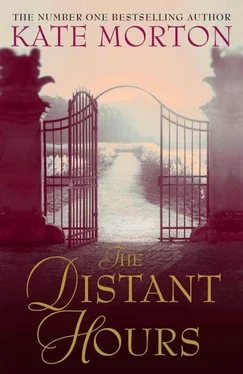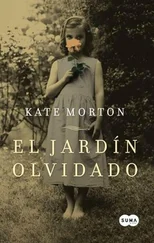I saw then an iron bench seat just beyond a low hedge, and an old man standing. It was evident from the way he stooped, the hand holding the back of the seat, that he’d been sitting until the moment we arrived, that he’d clambered to his feet out of habit, a vestige of the old-fashioned manners he’d no doubt been using all his life. He blinked through bottle-thick glasses. ‘Hello there,’ he said. ‘Join me, won’t you?’
‘I’ll leave you to it,’ said the nurse. ‘I’m just inside. Give me a yell if there’s anything you need.’ She bobbed her head, crossed her arms, and disappeared sprucely back along the red-brick path. The door closed behind her and Theo and I were left alone in the garden.
He was tiny, five foot tall if he was lucky, with the sort of portly body you might draw, if you were so inclined, by starting with a rough aubergine shape and strapping a belt across the widest point. He gestured away from me with a tufted head. ‘I’ve been sitting here watching the river. It never stops, you know.’
I liked his voice. Something in its warm timbre reminded me of being a very little child, of sitting cross-legged on a dusty carpet while a blurry-faced grown-up intoned reassuringly and my mind took leave to wander. I was aware suddenly that I had no idea how to begin speaking with this old man. That coming here had been an enormous mistake and I needed to leave immediately. I’d opened my mouth to tell him so when he said, ‘I’ve been stalling. I’m afraid I can’t place you. Forgive me, it’s my memory…’
‘It’s quite all right. We haven’t met before.’
‘Oh?’ He was silent and his lips moved slowly around his thoughts. ‘I see… well, never mind, you’re here now, and I don’t have a lot of visitors… I’m terribly sorry, I’ve forgotten your name already. I know Jean said it, but…’
Run , said my brain. ‘I’m Edie,’ said my mouth. ‘I’ve come about your advertisements.’
‘My…?’ He cupped his ear as if he might have misheard. ‘Advertisements, did you say? I’m sorry, but I think you might’ve confused me with someone else.’
I reached inside my bag and found the printout page from The Times. ‘I’ve come about Thomas Cavill,’ I said, holding it so he could see.
He wasn’t looking at the paper though. I’d startled him and his whole face changed, confusion swept aside by delight. ‘I’ve been waiting for you,’ he said eagerly. ‘Come, sit down, sit down. Who are you with then, the police? The military police?’
The police ? It was my turn for confusion. I shook my head.
He’d become agitated, clasping his small hands together and speaking very quickly: ‘I knew if I just lasted long enough, someone, someday would show a bit of interest in my brother. Come.’ He waved impatiently. ‘Sit down, please. Tell me – what is it? What have you found?’
I was utterly flummoxed; I had no idea what he meant. I went closer and spoke gently. ‘Mr Cavill, I think there’s been some sort of misunderstanding. I haven’t found anything and I’m not with the police. Or with the military for that matter. I’ve come because I’m trying to find your brother – to find Thomas – and I thought you might be able to help.’
His head inclined. ‘You thought I might… That I could help you …?’ Realization drained the colour from his cheeks. He held the back of the seat for support and nodded with a bitter dignity that made me ache, even though I didn’t understand its cause. ‘I see…’ A faint smile. ‘I see.’
I’d upset him and although I’d no idea how, or what the police might have to do with Thomas Cavill, I knew I had to say something to explain my presence. ‘Your brother was my mother’s teacher, back before the war. We were talking the other day, she and I, and she was telling me what an inspiration he was. That she was sorry to have lost contact with him.’ I swallowed, surprised and disturbed in equal measure by how easy it was for me to lie like this. ‘She was wondering what became of him, whether he kept teaching after the war, whether he got married.’
As I spoke, his attention had drifted back towards the river, but I could tell by the glaze of his eyes that he wasn’t seeing anything. Nothing that was there, at any rate; not the people strolling across the bridge, or the small boats bobbing on the distant bank, or the ferry-load of tourists with pointed cameras. ‘I’m afraid I’m going to disappoint you,’ he said finally. ‘I don’t have any idea what happened to Tom.’
Theo sat down, easing his back against the iron rails and picking up his story. ‘My brother disappeared in 1941. The middle of the war. First we knew was a knock at my mum’s door and the local bobby standing there. Wartime reserve policeman, he was – friend of my dad’s when he was alive, fought alongside him in the Great War. Ah – ’ Theo flapped his hand as if he were swatting a fly, ‘he was embarrassed, poor fellow. Must’ve hated delivering that sort of news.’
‘What sort of news?’
‘Tom hadn’t reported for duty and the bobby’d come to bring him in.’ Theo sighed with the memory. ‘Poor old Mum. What could she do? She told the fellow the truth: that Tom wasn’t there and she had no idea where he was staying, that he’d taken to living alone since he was wounded. Couldn’t settle back into the family home after Dunkirk.’
‘He was evacuated?’
Theo nodded. ‘Almost didn’t make it. He spent weeks in hospital afterwards; his leg mended up all right, but my sisters said he came out different to when he went in. He’d laugh in all the same places but there’d be a pause beforehand. Like he was reading lines from a script.’
A child had begun to cry nearby and Theo’s attention flickered in the direction of the river path; he smiled faintly. ‘Ice cream dropped,’ he said. ‘It wouldn’t be a Saturday in Putney if some poor kid didn’t lose his ice cream on that path.’
I waited for him to continue and when he didn’t, prompted him as gently as I could. ‘And what happened? What did your mother do?’
He was still watching the path, but he tapped his fingers on the back of the seat and said, in a quiet voice, ‘Tom was absent without leave in the middle of a war. The bobby’s hands were tied. He was a good man though, showed some leniency out of respect for Dad; gave Mum twenty-four hours to find Tom and have him report for duty before it all went official.’
‘But she didn’t? She didn’t find him.’
He shook his head. ‘Needle in a haystack. Mum and my sisters went to pieces. They searched everywhere they could think but…’ He shrugged weakly. ‘I was no help, I wasn’t there at the time – I’ve never forgiven myself for that. I was up north, training with my regiment. First I knew was when Mum’s letter arrived. By then it was too late. Tom was on the absconders’ list.’
‘I’m so sorry.’
‘He’s on it to this day.’ His eyes met mine and I was dismayed to see that they were glassy with tears. He straightened his thick spectacles, hooked the arms over his ears. ‘I’ve checked every year since because they told me once that some old fellows turn up decades later. Front up at the guardroom with their tail between their legs and a string of bad decisions behind them. Throw themselves on the mercy of the officer on duty.’ He lifted a hand and let it fall, helplessly, back to his knee. ‘I only check because I’m desperate. I know in my heart that Tom won’t be showing up at any guardroom.’ He met my concern, searched my eyes and said, ‘Dishonourable bloody discharge.’
There was chatter behind us and I glanced over my shoulder to see a young man helping an elderly woman through the door and into the garden. The woman laughed at something he’d said as they walked together slowly to look at the roses.
Читать дальше












